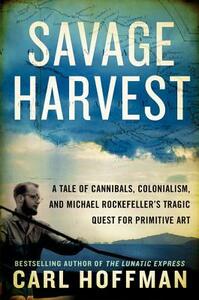Take a photo of a barcode or cover
92 reviews for:
Savage Harvest: A Tale of Cannibals, Colonialism, and Michael Rockefeller's Tragic Quest for Primitive Art
Carl Hoffman
92 reviews for:
Savage Harvest: A Tale of Cannibals, Colonialism, and Michael Rockefeller's Tragic Quest for Primitive Art
Carl Hoffman
Fascinating look at the story of Michael Rockefeller and the people and culture of 1960's Papua New Guinea. Gripping and thoroughly researched, Hoffman does a good job of investigating the numerous points of view--native, Dutch colonial and American as well.
Hoffman weaves a good tale in blending the history of the Asmat, the Dutch and Indonesian political and cultural situation, and Michael Rockefeller's untimely end. I usually don't approve of authors making themselves part of the story, but he made it work with the parallel-but-not journeys. Hoffman got a little too close to the magical-primitive trope at the end, but did redeem himself somewhat.
This book was a little dry in a few places, but overall an intriguing read.
A very informative read. I have come into the story with an open mind with no knowledge of the topic. The search for this one person was very extensive, but as unnecessary as it may have been for any human being, this was also a Rockefeller in a far off country. The story itself was interesting as far as learning about the culture and their primitive ways.
I enjoyed the informative read and hope that I continue reading more non-fiction like this in the future.
I enjoyed the informative read and hope that I continue reading more non-fiction like this in the future.
I got this book through a firstreads giveaway.
I'm not entirely sure what I expected of this book--my husband is a subscriber of conspiracy theories, and 'Rockefeller' stood out to me.
Conspiracies aside, this book was fantastic. It was so much more than "rich man vs. savages". I can't imagine anyone reading this as nonfiction, though, as I originally thought it might be (I judge by the cover, so sue me.)
All in all this was an entertaining book and interesting addition to our 'possible but probably not true' conspiracy collection.
I'm not entirely sure what I expected of this book--my husband is a subscriber of conspiracy theories, and 'Rockefeller' stood out to me.
Conspiracies aside, this book was fantastic. It was so much more than "rich man vs. savages". I can't imagine anyone reading this as nonfiction, though, as I originally thought it might be (I judge by the cover, so sue me.)
All in all this was an entertaining book and interesting addition to our 'possible but probably not true' conspiracy collection.
dark
informative
mysterious
medium-paced
Graphic: Cannibalism, Colonisation
adventurous
challenging
dark
mysterious
medium-paced
This book was a little slow at first, but the last half went faster and was interesting. It was difficult to keep all of the people, places and stories straight, but overall this was an intriguing book.
While Hoffman in this book claims to “illuminate a culture transformed by years of colonial rule,” the whole narrative itself seems to further perpetuate it. Hoffman is quick to criticize the decades of Dutch colonial rule in this area and points out that the “pull of the primitive” is outdated, but his descriptions of the Asmat and being around them read like a 19th century anthropological account. Here, cannibalism is still being treated like an oddity in a very voyeuristic and almost sensationalized way. It felt wrong and kind of off-putting to me. I understand what Hoffman was trying to do, but I don’t think that there was much awareness on the part of Hoffman as to his position; A white male, asking questions about another white male who died 50 years earlier. By framing his story this way, with the focus on the murder of Michael Rockefeller, Hoffman is essentially shaming the culture for their ritual practice of cannibalism, whether he intends to or not.
Read Full Review: https://mybookbagblog.wordpress.com/2015/01/29/carl-hoffman-savage-harvest-2014/
Read Full Review: https://mybookbagblog.wordpress.com/2015/01/29/carl-hoffman-savage-harvest-2014/
Savage Harvest is notable more for its exploration of headhunting as a dying vestige of the Asmat culture and its evocation of one of the remotest corners of the world than for its attempt to solve the mystery of what happened to Michael Rockefeller.





